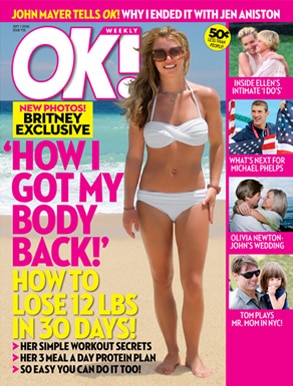I consider myself an active consumer, even though I tend to self-criticize myself for not shopping more at local farmer's markets and getting caught up in the food convenience maze. While I'm shopping, I think about how to deconstruct the grocery store lingo all the time -- shop the perimeters for the most "real" food, remember to decipher the following accurately: the difference between "light" and "lite," "low fat" and "reduced fat," "low sugar" and "no sugar added," etc.
But there is one element of grocery shopping that I continue to find more toxic than any single ingredient in the overly processed food we buy here in the United States. It's the experience of standing in line at the check out counter. Despite the fact that I do not purchase subscriptions to "women's magazines" (and I can't remember the last time I ever bought one), I regularly have some general sense of whose boyfriend Kim Kardashian is sleeping with, who last dumped Jennifer Aniston, how desperately they both want a baby, which female celebrities are pregnant, which are too fat or too thin, which have lost their baby fat the quickest and .... the ever coveted title, "the one who lost 10 pounds in two weeks" or "12 pounds in 30 days."
These magazines leave toxic effects on anyone and everyone who passes through the check out line, leaving no opportunity to avoid them if one chooses to shop at these stores. The $5-7 we spend on each one is not a form of entertainment. Rather, it's an opportunity for the media to spotlight and reward women for being a temptress, never being single, and starving herself while scorning those who choose to not have a man in her life, choose to not have a child, choose to focus on raising her newborn child rather than getting "her body back," or choosing to embrace her body in its natural form.
The truth is that women are never empowered to have "their own body" in this image-driven, look-at-me society which is getting more and more intensified with the continued popularity of reality shows like The Real Housewives of ________ (enter any city name here -- it really doesn't matter!), Toddlers and Tiaras, The Bachelor, etc. Even "the beautiful ones" must alter their appearance to be beautiful and then their appearance is still heavily touched upon in Photoshop (wrinkles and pores vanish, bust lines are enhanced, and slim waist lines are carved away).
Like the paintings and sculptures of women that adorn the walls of the world's acclaimed art museums, our bodies today -- in real, 3d form and in images -- are still carved, chiseled, and sculpted into an ideal that has been constructed over thousands of years to fulfill the desires of men. We exist to be looked at and, in turn, our actions are undervalued and our opportunities to participate, explore, and change the world are diminished.
Of course, these magazines will never cease from being displayed, for our economy relies too heavily upon women to feel like crap about themselves. The worse we feel about ourselves, the more money we spend on products and services to make us look and act more like those who are idealized and celebrated on the covers of magazines.
In fact, in recent years, despite our country being in the midst of the worst economic crumble since the Great Depression, we've seen the emergence of an entire new industry: The Med Spa. Where women, now as young as their mid-20s, are "empowered" to spend hundreds of dollars to reclaim their once wrinkle-free faces by being injected with the same poison that paralyzes -- and kills -- a human infected with botulism, among other invigorating "treatments." Meanwhile, eating disorders among pre-teens continue to rise and preschoolers demonstrate that they too have internalized the "fear of being fat" by associating "being pretty" not only with being thin but also with being "nice" and "having friends."

So, the question is...when, oh when, will we integrate media literacy into the foundation of education in the United States to put girls/women and boys/men, on a path to becoming visually literate so they can actively deconstruct these toxic gender messages and be encouraged to support a life in which women are encouraged to live independently and fully participate in this world that needs them so very much? Without the ability to view one's visual context critically, the underlying values that perpetuate the construction of gender in our society will continue to be silently internalized. And the check out line at your local grocery store will continue to remain toxic.



1 comment:
I so agree with you. These magazines and the commercial media in general is offensive, wrong and a form of semiotic pollution. I recently had a pollster knock on my door and they could not believe that I didn't listen or consume the vast torrent of commercial media available to me. It is absolutely critical that all students learn how to deconstruct the images, signs and sounds that attempt to persuade us that their messages are true. I often tell my students that, "If it is too good to be true, it is", "don't believe the hype", "I want your opinion not the media". Great blog keep it up.
Post a Comment